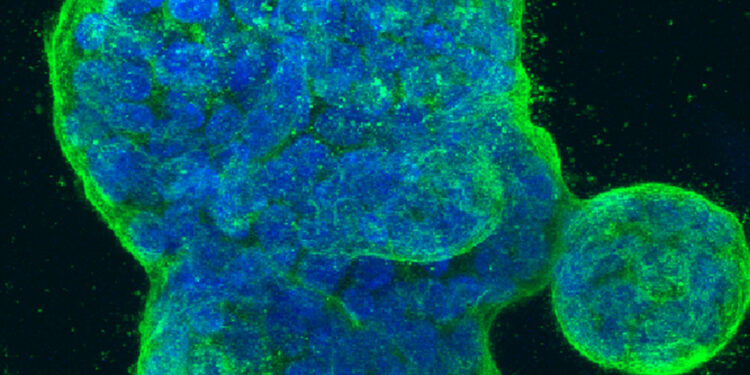Three-dimensional culture of human breast cancer cells, with DNA stained blue and a cell surface membrane protein stained green. Credit: NCI Center for Cancer Research, National Cancer Institute, National Institutes of Health
Women around the world could benefit from better treatment thanks to new AI technology that can better detect damaged cells and more accurately predict the risk of developing breast cancer, new research from the University of Copenhagen shows.
Breast cancer is one of the most common types of cancer. In 2022, the disease caused 670,000 deaths worldwide. Now, a new study from the University of Copenhagen shows that AI can help women improve their treatment by looking for irregular-looking cells for better risk assessment.
The study, published in Digital health in The Lancetfound that AI technology was significantly more effective at predicting cancer risk than current clinical standards for breast cancer risk assessment.
The researchers used deep learning AI technology developed at the University of Copenhagen to analyze donor breast tissue biopsies for signs of damaged cells, an indicator of cancer risk.
“The algorithm represents a major step forward in our ability to identify these cells. Millions of biopsies are performed each year, and this technology can help us better identify risks and offer women better treatment,” says Associate Professor Morten Scheibye-Knudsen of the Department of Cellular and Molecular Medicine and lead author of the study.
Predicts five times higher risk of breast cancer cases
One of the key aspects of cancer risk assessment is looking for dying cells, caused by something called cellular senescence. Senescent cells are still metabolically active but have stopped dividing. Previous research has shown that this state of senescence can help slow the growth of cancer. However, senescent cells can also cause inflammation that can lead to tumor development.
By using deep learning AI to look for senescent cells in tissue biopsies, the researchers were able to predict breast cancer risk better than the Gail model, the current gold standard for assessing breast cancer risk.
“We also found that if we combine two of our own models or one of our models with the Gail score, we get much better results in predicting the risk of developing cancer. A combination of models gave us an odds ratio of 4.70, which is huge. It’s significant if we can look at cells from an otherwise healthy biopsy sample and predict that the donor is almost five times more likely to develop cancer several years later,” says Indra Heckenbach, first author of the study.
Algorithm trained on ‘zombie cells’ may offer better treatment
The researchers trained the AI technology on cells grown in cell culture that had been intentionally damaged to make them senescent. The researchers then used the AI on donor biopsies to detect senescent cells.
“We sometimes call them zombie cells because they have lost some of their function, but they are not quite dead. They are associated with the development of cancer, which is why we developed and trained the algorithm to predict cellular senescence. Specifically, our algorithm looks at the shape of cell nuclei because nuclei become more irregular when cells are senescent,” Heckenbach says.
It will still be several years before the technology is available in clinics, but it could then be applied worldwide, as it only requires images of standard tissue samples to perform the analysis. Women around the world could then potentially use this new discovery to get better treatment.
Scheibye-Knudsen adds: “We will be able to use this information to classify patients according to risk and improve treatment and screening protocols. Doctors will be able to monitor high-risk people more closely, they will be able to have more frequent mammograms and biopsies, and we will potentially be able to detect cancer earlier. At the same time, we will be able to reduce the burden on low-risk people, for example by performing biopsies less frequently.”
More information:
Indra Heckenbach et al., Deep learning assessment of senescence-associated nuclear morphologies in breast tissue from healthy donors to predict future breast cancer risk: a retrospective cohort study, Digital health in The Lancet (2024). www.thelancet.com/journals/lan… (24)00150-X/fulltext
Provided by the University of Copenhagen
Quote: AI could predict breast cancer risk via ‘zombie cells’ (2024, September 25) retrieved September 25, 2024 from
This document is subject to copyright. Apart from any fair dealing for the purpose of private study or research, no part may be reproduced without written permission. The content is provided for informational purposes only.



